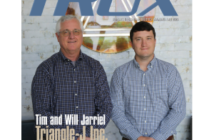by Lyle Fitzsimmons
Martha Martin fits some of the old Southern stereotypes perfectly.
She was raised on a rural farm. She’s been married to the same man for more than 50 years. And she likes few things better than talking about her kids and doting on her grandchildren.
But that whole career thing? Yeah, even she concedes that’s a little bit different.
“My parents were hard-working people, but we had a remarkably loving home,” the Forsyth County native says. “And all they ever told us kids – we had four girls – was that we could do anything we wanted to do. Don’t wait for people to do for you, go and do for yourself and make sure you do for others, too. The bottom line was: go after whatever you want.”

Martha Martin, shown here with GMTA’s Emily Braund, helped to sell gun raffle tickets at the Annual Fund Open. “Every trucking company needs to look at being a GMTA member,” she says.
For Martin, that meant pursuing a life in what had been – and, she says, remains – a man’s world: trucking. So, after a stint at business school in Atlanta where she initially sought a career as an executive secretary, her true maverick intentions won out.
“No one else in my family was in the trucking business, but I always was interested in it; I liked it and I always could see myself owning my own trucks,” she says. “I worked for some truck brokers in the 1960s and I became a partner in the business after a few years, plus I did side jobs involving permits, which was a much more complicated process back then.
“One of the gentlemen that I did permits for told me about a man he’d sold a truck to who was looking for a partner in his trucking business, so we went into business together in 1972. We were partners for nine years until he left the company and I retained it. I was so intrigued by the business that I didn’t want to leave it.”
And with that decision, the modern version of Phil-Mart Transportation was born.
The company has been in business ever since, and has thus far successfully adjusted to the ever-present changes in the industry and the always impactful cycles in the economy – a change in service areas here, a shift in resources there.
These days, Martin heads to work at the home office in Braselton, where she’s greeted by her daughter, Cheryl, who got a college degree in accounting/finance and has been her right-hand woman since arriving in 1981. Neither of the men in the family, Martin’s husband or son, is involved with the business beyond moral support.
The boundary lines with her spouse, Max, a commercial builder, were intentionally drawn to preserve domestic tranquility, Martin says.
“He’s got his business and he’s the boss there. When it comes to my business, I’m the boss. So we don’t make suggestions or give opinions,” she says. “We’d tell each other, I don’t build his buildings and he doesn’t drive my trucks. We’ve been married 55 years, so it works.”
Getting buy-in from the men she encountered elsewhere wasn’t so simple.
“We were running produce out of Florida, up the East Coast and out to Chicago. We ran all over the country,” she says. “And I’d still talk to and deal with some people back then who automatically assumed I was just some office girl. You had to work three or four times harder just to show people that you knew what you were doing.
“You had to prove yourself, but fortunately, once you did, they became believers. It’s the same as any business. If you have people you deal with who believe in you and your company, all you need to do is do a good job. If you do a good job, you have a friend and a supporter for life.”
Martin’s pioneering role has made her a go-to source of inspiration, counsel and role-modeling for women trying to become similar success stories in their own lines of work.
And when approached, so goes with the same simple mantra.
“The first thing you have to do is believe in yourself,” she says. “If you believe in yourself, you can do anything you want to do except give yourself an opportunity. If you’re good, that opportunity will come and you’ll have the chance to make the most of it.”
In fact, her success at Phil-Mart has prompted others to give women a chance as well.
“I’m fortunate that my husband has always been supportive of me,” Martin says. “There were times that he gave women opportunities to be managers in his construction business and set them up in jobs that they didn’t often have a chance to get. Because of what he saw me doing, he knew he always had to keep a door open.
“I’ve always believed that, if you wanted a good employee, hire a mother. She can juggle children, a household, a husband and all the rest of the things that come along in life. If you want a good employee, you need someone who can juggle. You get that in a mother.”
As for the business support, she says, you get that from association membership.
Martin is a long-time GMTA member and has been active on boards and committees that help the organization advance its mission of working to make Georgia the best state in the nation in which to base and operate a trucking company.
“Every trucking company needs to look at being a GMTA member,” she says. “When you need answers to questions about new laws, the different elements of regulations, all you have to do is pick up the phone and they can answer your questions. Or, if they don’t have an answer, they’ll get you one. It’s better than trying to find everything out from a book. And over the years you go to the events and you meet the people and you develop friendships.
“I cannot imagine a company not wanting to be a member.”
And when it comes to her business, Martin cannot imagine it not staying in the family.
Though she’s got no immediate plans to give up her leadership role, her ideal succession plan would cede full control of the company to her daughter, who then would bring in a novelty, a man – Martin’s grandson, Wyatt, now 13 – to climb the ranks and keep the name intact.
“Nothing would thrill me more than to see my daughter and my grandson working together like she worked with me,” Martin says. “He thinks trucking is pretty cool, so I hope in the future the company is there to be passed down to him. It makes me feel proud that there’s something that’s been built through the years that can be available to pass down.
“I hope the changing times and the industry will allow that to happen.”



